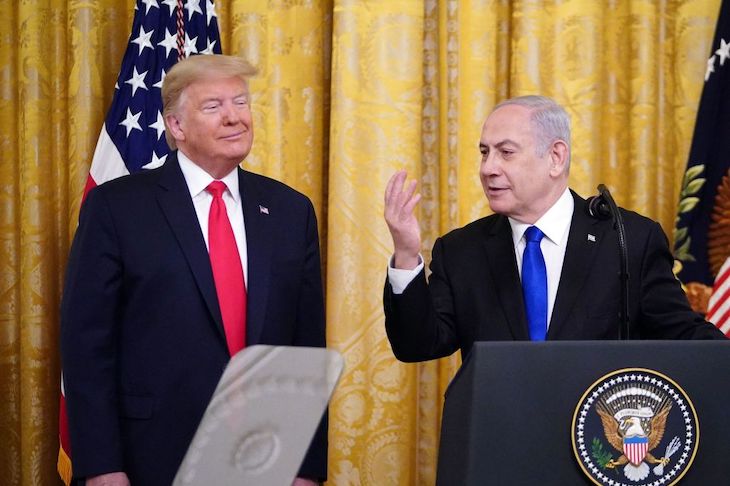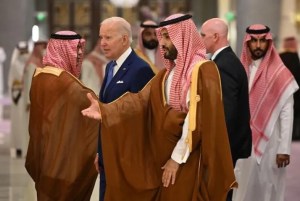‘In business, when I have a tough deal, people would say, “This is tougher than the Israelis and the Palestinians,”’ said President Donald Trump as he unveiled his long-awaited Middle East plan, the so-called Deal of the Century, during a White House ceremony on Tuesday.
The comment, ad-libbed, not only demonstrated that the former real-estate tycoon does have a sense of humor. It suggested that, contrary to the conventional wisdom, President Trump is ready to do business when it comes to peace in the Holy Land. ‘Actually, there’s nothing tougher than this one but we have to get it done,’ he added. ‘We have an obligation to humanity to get it done.’
The Washington foreign-policy pundit class, with its long list of failed Middle East ‘peace processors’ behind them, has dismissed the president’s plan as a ‘con’ and a ‘fraud,’ comparing it to a ludicrous real-estate deal. Trump’s plan has been bashed as one sided (and on the wrong side, that is Israel). It is being widely interpreted as an attempt to bolster the re-election prospects of ‘Bibi’ Netanyahu, Trump’s BFF in Jerusalem, and a pay-off to his pro-Israeli donors, such as Las Vegas billionaire, Sheldon Adelson, who attended the ceremony on Tuesday.
But the critics rarely mention the fact that all of Trump’s predecessors in office ended their search for peace in the Holy Land with disastrous results.
So now we have a president who has decided not to follow the footsteps of the former peace processors. He has decided against employing the old script, which assumed that more concessions to the Palestinians over Jewish settlements in the West Bank, Jerusalem, the 1948 Arab refugees, and the ‘right of return’ was going to do the job. Such a script made for the all too familiar, depressing movie: Palestinian leaders rejecting every peace plan offered to them and insisting that only more American pressure on Israel would produce a happy ending.
Trump has been able to advance a new Middle East paradigm that reflects changing geopolitical realities. An energy independent America is now less susceptible to Palestinian blackmail, especially since most of the Arab World has placed solidarity with their Palestinian brethren at the bottom of their policy agendas.
Unburdened by liberal guilt towards poor ‘victims’ and people of color in general, and rejecting the myth that European Jewish colonialists are responsible for the suffering of the indigenous people of Palestine in particular, Trump does not disguise that his sympathies lie with the economically thriving Israeli democracy, what he regards as a major American ally.
Trump is unabashed that his peace plan reflects those sentiments.
But his plan does offer American support for the establishment of an independent Palestinian state with its capital in East Jerusalem, more than $50 billion in economic aid to the new entity, and provides the two sides with the services of Trump the dealmaker in the next four years. Again, the critics can scoff. Do they have a better idea?
The Palestinians, who had hoped that Jeremy Corbyn would be Britain’s PM, are now fantasizing that ‘Bibi’ will be ousted in the Israeli election in March, despite the fact that the head of the Israeli opposition, retired general Benny Gantz has met with Trump in Washington and expressed strong support for his plan. Giving a bad name to wishful thinking, the Palestinians are now left counting their hopes on the election of Bernie Sanders as the next US president.
The Palestinians should instead take Trump at his word and recognize that if they play the game right, they may discover that Trump could help them achieve political independence and economic revival. They don’t have a lot to lose, except more years under Israeli occupation.
This article was originally published onThe Spectator’s UK website.



















